What Does Remote Work Mean? Definition, Benefits, and Disadvantages
No Credit Card Required.

Key Summary:
-
Remote work means doing your job outside traditional office spaces using laptops and Wi-Fi.
-
Types include full remote work arrangements, WFH (work from home), hybrid, and freelance remote/contract roles.
-
Employee monitoring tools like Apploye help track average time, manage tasks, and monitor productivity for remote teams.
-
Remote workers can save $2,000–$6,500/year and enjoy more flexibility and work-life balance.
Remote work isn’t new, but COVID-19 made it the new norm. It’s a major shift from our professional lives.
But what does remote work actually mean?
Here, we'll explore the concept, how remote work is different from working from home, also its advantages and disadvantages.
In this article
What is the Definition of Remote Work?
Remote work is doing your job from somewhere other than a regular office setting. It might be your home, a co-working space, or even a local café with good coffee and Wi-Fi.
The concept is simple.
You don’t have to be in a centralized office location to get your work done.
With a laptop, internet connection, and the right tools, you can do your job from almost anywhere.
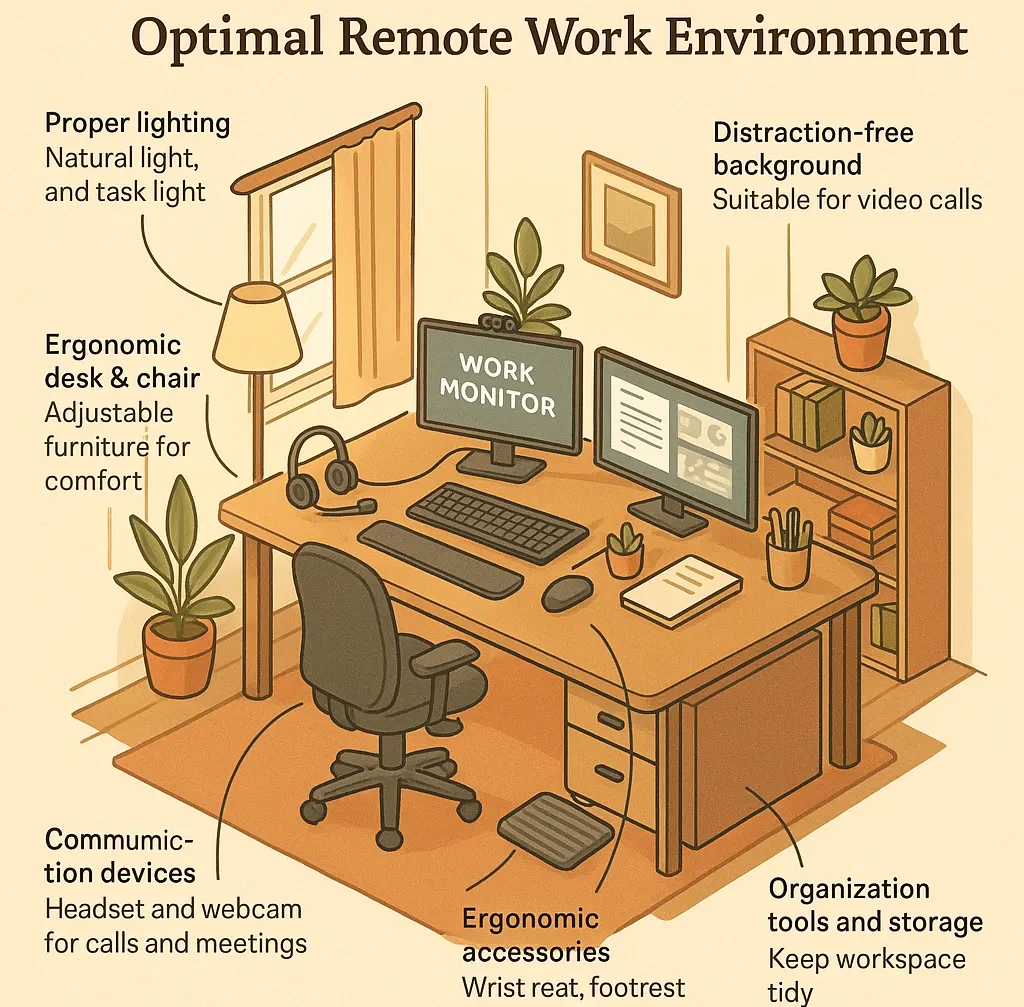
Nowadays, a trendy topic in the working sector is remote work settings.
Remote workforce is a form of work arrangement that doesn’t require you to go to a physical location. You can work from your home, from a park, a cafe, a bar, or anywhere you like to work.
You have the freedom to choose your primary work location.
Remote work is also called telecommuting, future of work, telework, working from home, and mobile work.
Track your productivity from anywhere
Types of Remote Work Models
Remote job opportunities have surged, now making up over 15% of all U.S. jobs, up from just 4% before the pandemic. Remote work potential continues to expand across industries.
While all flexible working arrangements are close to each other, they are not the same. Different remote work options are:
Fully Remote WFH
Our study found that fully remote employees reported 65% higher job satisfaction while maintaining productivity levels. This improved employee engagement translates to better outcomes for companies.
While remote work can be performed from anywhere, WFH specifically requires you to work from home.
Depending on your company, you may be asked to remain within the city to attend some in-person meetings. There may also be some community events with the WFH workers.
Hybrid (Part Office, Part Remote)
“Hybrid work will allow us to achieve the best of both worlds, the focus and collaboration of the office, and the flexibility and autonomy of remote work.”
- Tim Cook, CEO of Apple
In this work structure, some days you will be working from home, and other days from the central office.
While few companies mandate when you will be working from home, many offer you to choose when you would like to work remotely.
Most businesses nowadays are adopting a hybrid work environment, since it offers the best of both worlds. Many organizations implement comprehensive remote work policies to ensure smooth operations.
To sum up, WFH is a specific kind of remote work. Whereas, hybrid work combines office work with remote work in a hybrid arrangement.
Freelance/Contract Remote Jobs
Data released by the BLS in November 2024 confirmed that independent contractor working arrangements increased by more than 12% over the six-year period from 2017 to 2023.
If you love flexibility and working on your terms, freelance or contract remote jobs might be your thing.
Freelancers usually work on short-term projects for different clients.
While contract workers often commit to one client for a longer stretch, like a few months, both let you skip the office and work from wherever feels right.
A formal remote work agreement is essential for setting clear expectations in these arrangements.
Sure, you’ll have to manage your own time and find new gigs, but the freedom to choose what you work on (and when) makes it worth it. Many people transition from full-time employment to freelance work for this reason.
Flexible work needs smart tracking
Work From Home vs. Remote Work: What’s the Difference?
These three remote terms may sound similar, but there are significant differences among these remote options.
Let’s clarify the difference between remote work, work from home, and flexible work.
Remote Work
- You can work from anywhere globally without any restrictions on timezone, country, or even state.
- You don’t have to come into the branch office for meetings or team activities.
- Your colleagues might also be located anywhere they want.
Work From Home
Work from home is where remote work employees can do their work from their homes. It balances your work life and personal life nicely.
However, working from home is something that doesn't have to be just for full-time remote workers. It can also be for those who want to do their work from the office or at home.
And from time to time, employees may need to visit the office for important meetings.
How to Monitor Employees Working from Home
Flexible Work
A flexible work environment gives employees the choice of what time they want to start their work, where they want to work, and when to stop working.
Flexible work arrangements allow your schedule to be flexible according to your time management. This category is suitable for those who work from different time zones.
Alternative schedules are increasingly common in global companies.
But we can’t say that remote work is complete because you can also work from your office for various time shifts.
Manage remote teams effortlessly
Who is Remote Work for?
Common remote worker personas:
Digital Nomads
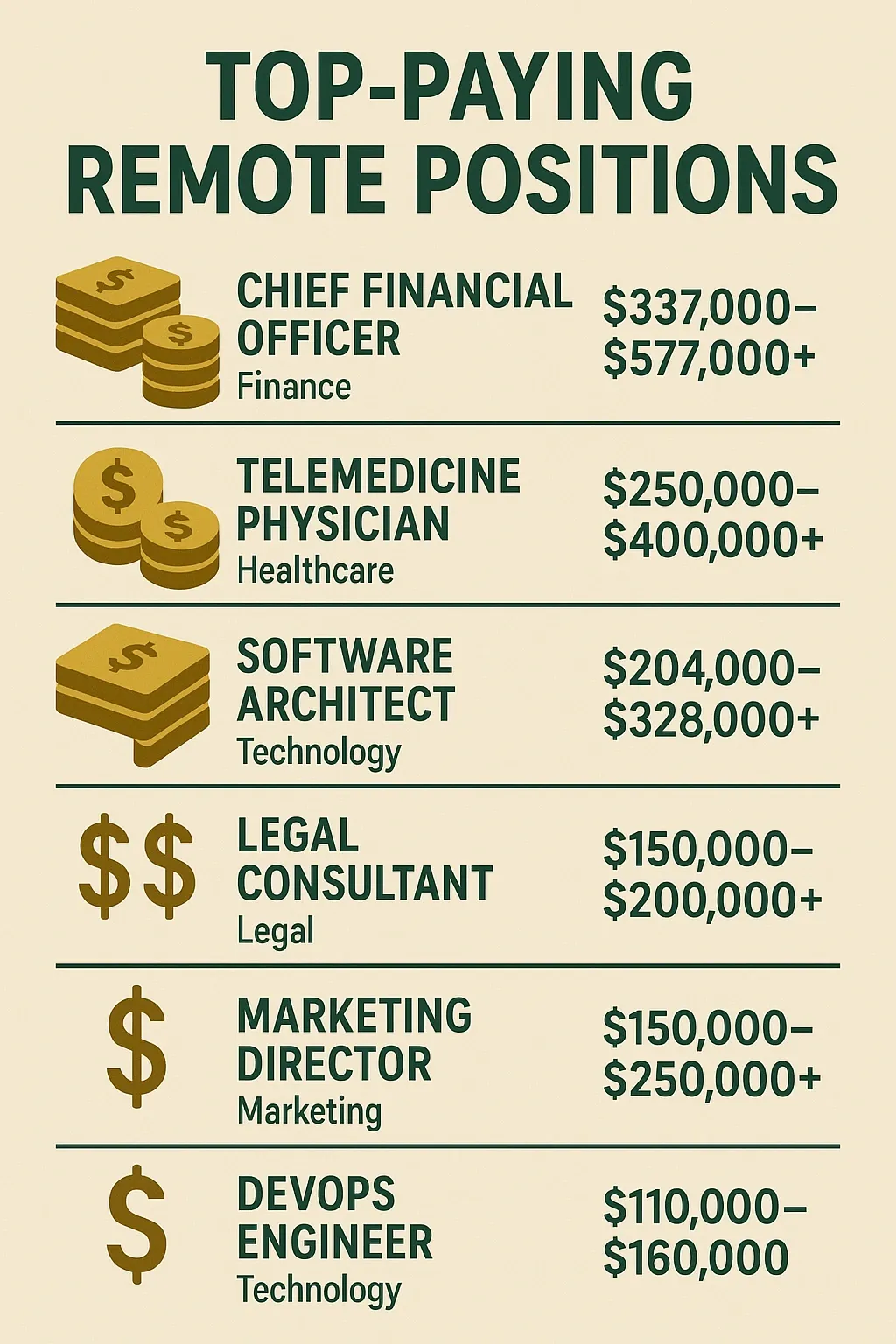
Digital nomads are people who work remotely while traveling or living in different places around the world. They rely on digital technology to connect with teams, clients, or employers from wherever they are.
Even though this sounds flexible, it still involves deadlines, meetings, and full professional responsibilities.
What sets digital nomads apart is the freedom to decide where their “office” will be each day. Having a growth mindset is essential for adapting to different work environments.
Remote Employees in Corporations
Remote work in corporate offices often follows a hybrid model.
Employees primarily work from home but occasionally go to the office for meetings, training, or team collaboration. The cost of office space has led many corporations to embrace remote options.
Unlike fully remote roles, hybrid work is flexible with the structure of social interaction.
Jobs involving writing, designing, data analysis, project management, or customer service representatives can often be done effectively anywhere.
Freelancers & Consultants
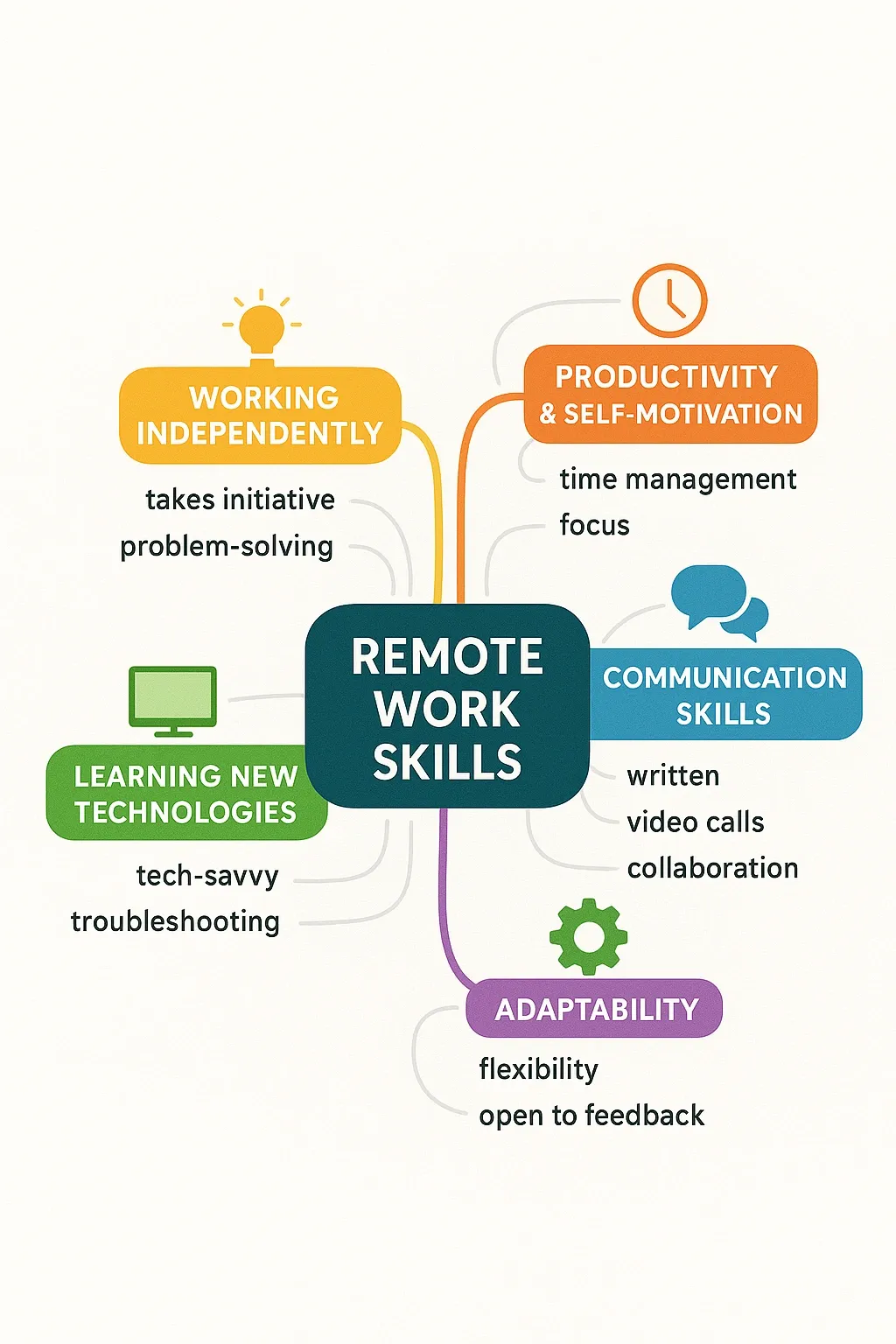
Freelancing and consulting create amazing remote work opportunities, especially in digital marketing, software development, and project management fields.
Upwork, Fiverr, and Toptal make it simple to connect with clients from all over the world.
Similarly, as a consultant, you get to work on your terms. This autonomy enhances internal work motivation and productivity.
The best part is that you can control your schedule and where you work.
Business owners
Remote work is a game-changer for business owners. It offers flexibility, cost savings, and access to a global talent pool.
Moreover, you can grow your business more efficiently by aligning remote work with a strong enterprise cloud strategy.
Companies implementing growth strategies often incorporate remote work models. And Atlassian and Zapier have proven that it’s possible to thrive with remote teams.
Track your team from anywhere
Benefits of Remote Work
“One of the secret benefits of using remote workers is that the work itself becomes the yardstick to judge someone’s performance.”
- Jason Fried, CEO of Basecamp
Improved Work-Life Balance
Remote work allows you to manage your work and personal life better.
Once there is no daily commute to a centralized office location, you can spend more time doing what is most important. You can spend it with family, take care of yourself, or relax.
This flexibility also reduces stress and makes you feel you have a better hold on your day. It makes you a better, happier, and more fulfilled person at work and home.
Flexibility and Autonomy
Remote work provides the ability to work wherever, whenever, or however is convenient to you.
You don’t have to stick to a 9–5 routine.
So when it comes to how you balance your work and life, it makes it easy.
Plus, you can control your day and be in charge of your workflow. This sense of task significance increases job satisfaction.
Broader Job Opportunities
One of the nicest things about remote work is more job opportunities. You don’t have to search for jobs in your city, you can apply everywhere, especially to companies in some of the top remote work countries.
And the same applies to companies, they can source talent from everywhere.
A business in the UK could use a US employer of record to hire in the States, for example, or vice versa.
It creates possibilities that once seemed to be out of reach. You don’t have to relocate or change your life to get a job you love.
Boost remote productivity
Tools and Technologies That Allow You to Work Remotely
Communication (Slack, Zoom, Microsoft Teams)
I’ve been using Slack for quick chatting and team updates. Zoom is also the one that I call when I need a quick video call.
If you want everything in one location, you are good with Microsoft Teams, which includes chat, calls, and file sharing with your remote teams.
These collaboration technologies are critical for remote team success.
Project Management Software (Trello, Apploye, Asana, Basecamp)
For remote work, Trello is great for small teams with its visual, easy-to-use boards.
On the other hand, Apploye and Asana are more suited to larger teams, with more options for task management and effective communication.
Also, Basecamp makes things uncomplicated with complete task tracking, team communication, and file sharing, and is ideal for smaller teams or solo projects.
Collaboration Tools (Google Workspace, Notion)
Google Workspace is awesome for real-time collaboration. You can edit any documents, share any files, and communicate freely.
Notion, however, organizes tasks, manages projects, and stores information in a customizable place.
Time Management (Apploye)
Apploye is one of the best time tracking and employee monitoring tools, ideal for remote teams.
It allows remote workers to clock in and out timely, monitor their internet usage and online activities when they are working, and provide timesheets & detailed reports in detail.
It also manages tasks, monitors screen and computer activity.
So employers can handle projects and watch employees working remotely, increasing productivity.
Are Remote Workers More Productive?
"People are more productive working at home than people would have expected. Some people thought that everything was just going to fall apart, and it hasn't. And a lot of people are actually saying that they're more productive now."
- Mark Zuckerberg, CEO of Meta (Facebook)
According to Owl Labs, 79% of managers feel their team is more productive when working remotely.
I have seen that when someone works from home or anywhere, they often get more work done and become more productive. This productivity often leads to increased customer satisfaction in service-oriented businesses.
Productivity is simply how well organized you are at completing tasks.
Productivity increases when it's a matter of environment; some employees find their home environment pleasant, others have their working zone where they are comfortable.
Employees also love remote work because they can spend more quality time with their families. They can cook, and they can enjoy their own company.
In the end, inner happiness matters the most. When you’re happy, you will be more productive.
Are Remote Workers More Productive?- Practical Feedback
How to Get Remote Jobs
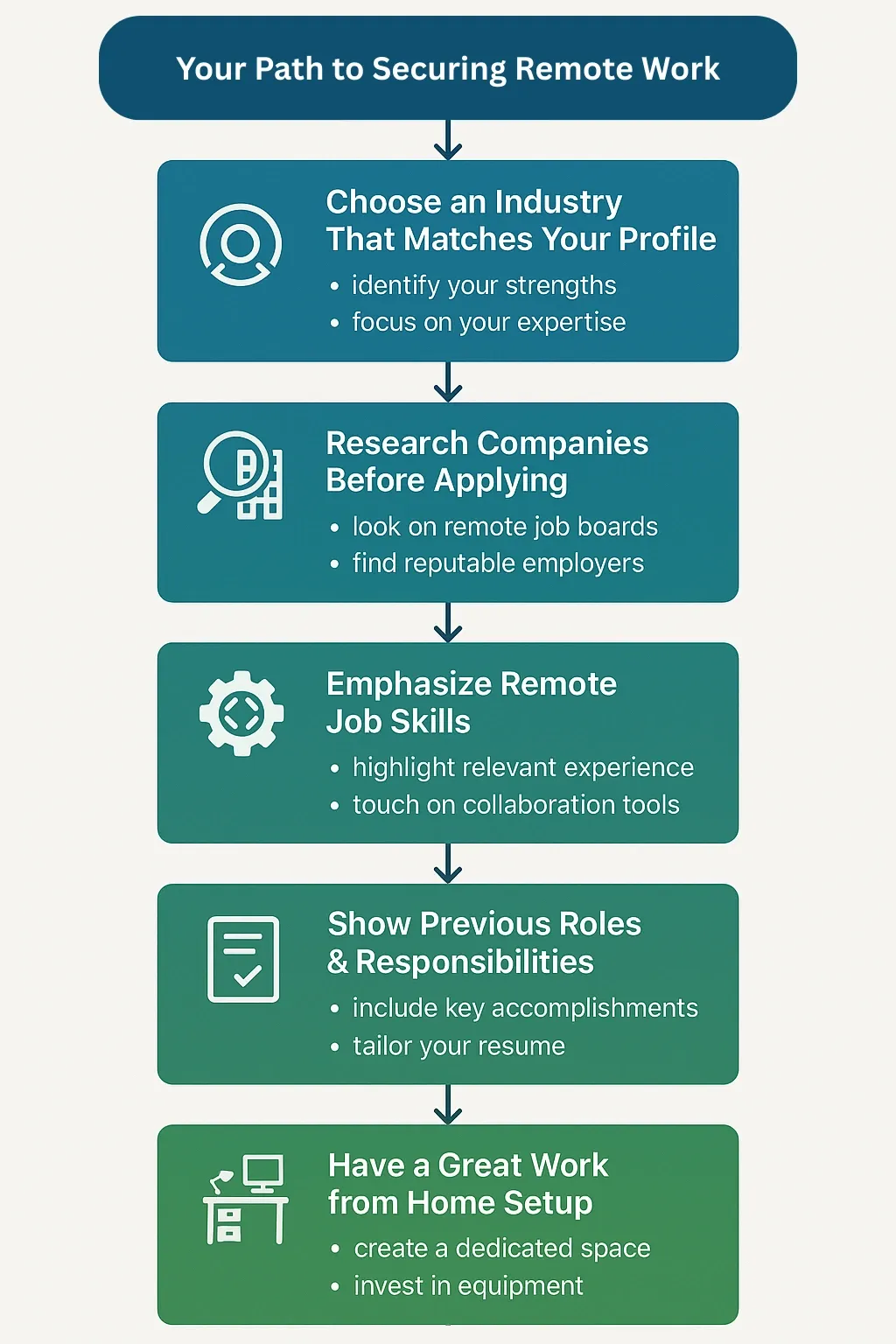
Okay, we are already talking a lot about remote work, its benefits, disadvantages, and many more regarding this topic.
Now we will be talking about how we get these jobs easily. The internet has made job searching easier.
Firstly,
Decide what position suits you
You need to choose what position you’re looking forward to building up your career.
Do you want to be a copywriter? Think about what sector interests you more. When your decision is clear, you can effortlessly search about this particular sector and maybe do it online remotely.
Here are some positions maybe you might like:
- VP Marketing
- SEO Specialist
- Content Writer
- Copywriter
- Software Development
- Customer Service
- Sales
Many more positions are popping up around you. Just do what you want to, be it an SEO Specialist or any other job.
Dedicated Remote Job Boards
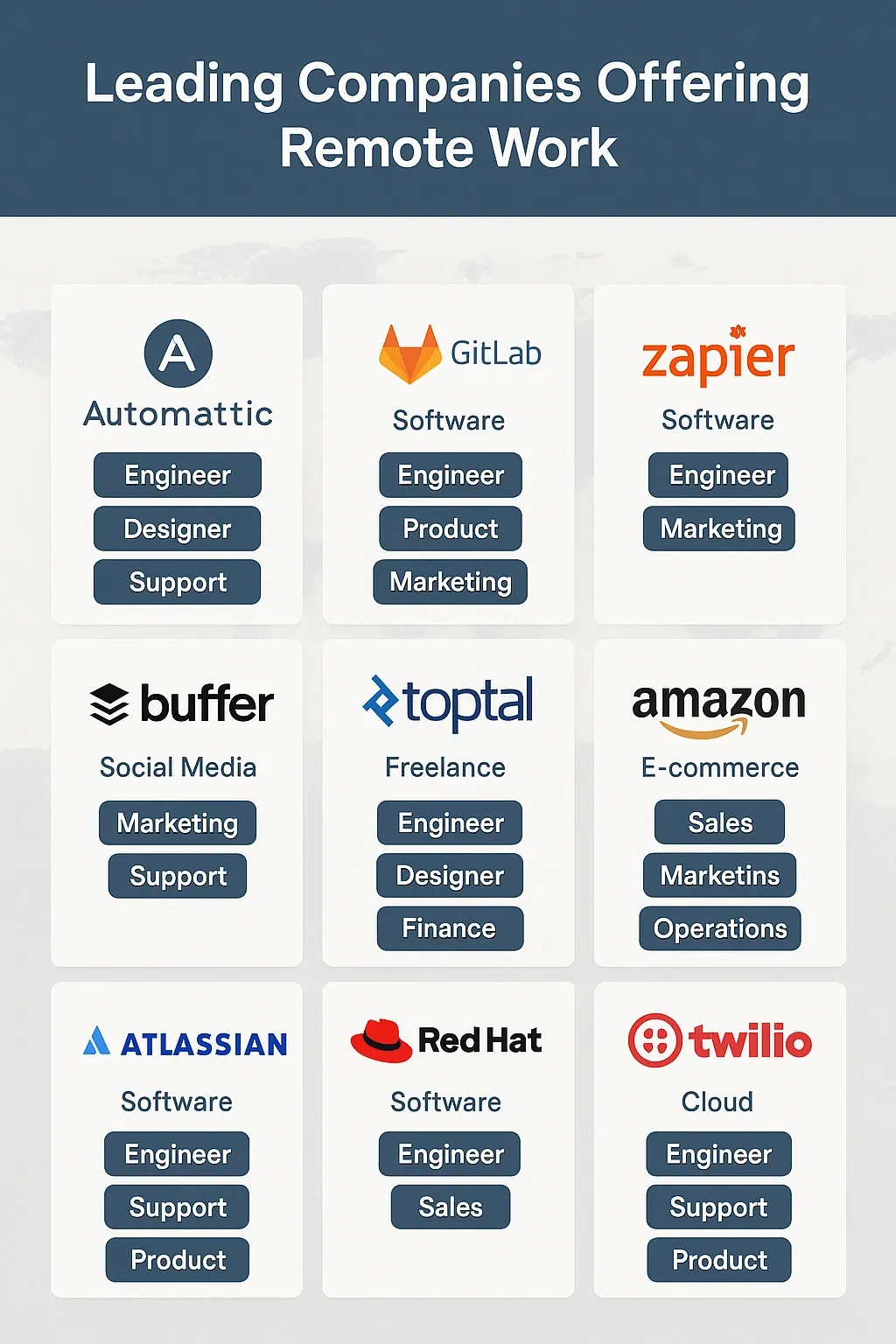
Let's get into some freelance websites that will give you remote job opportunities.
- Upwork
- Working Nomads
- Remotive
- Flexjobs
- We Work Remotely
- Freelancer. com
- Pyjama Jobs
"The growth in hybrid job postings increased from 9% in Q1 2023 to nearly a quarter (23%) of new jobs by the end of 2024. Fully remote jobs have also increased over the last two years from 10% in Q1 2023 to 15% in Q4 2024."
- Robert Half.
"The growth in hybrid job postings increased from 9% in Q1 2023 to nearly a quarter (23%) of new jobs by the end of 2024. Fully remote jobs have also increased over the last two years from 10% in Q1 2023 to 15% in Q4 2024."
- Robert Half.
Tech-Related Remote Work Opportunities
- Dice
- AngelList
- Gun. io
- GitHub Jobs
- Authentic Jobs
Before starting your remote work journey, have a look at tips and tools for working remotely. That will help you to get more work done remotely and stay productive.
Further Read:
10 Best Industries for Remote Work Opportunities
Final Thoughts — It’s Not About Where You Work, But How
The number of full-time remote workers is growing gradually due to its benefits and the freedom it gives.
Remote work has some remarkable benefits for both employees and employers. So if you think that remote work might be a good choice for you, then you can take advantage of these benefits.
Frequently Asked Questions About Remote Work
What is the meaning of remote work?
Remote working means performing one’s job from somewhere other than the traditional office. It may be your home or a coffee shop. It’s also known as telecommuting or working from home.
Is remote the same as work from home?
No, both remote work and work from home are not the same thing. Working from home means working from the place you live. Remote work is a bigger term, which refers to work from any location other than a traditional office.
How do you explain remote work?
Remote work means doing your job somewhere outside the standard office. It is flexible and removes the daily commute. Employees stay connected using digital tools like email, video calls, and project management platforms.
In remote work setups where note-taking can be easily overlooked during fast-paced calls, using an ai note taker ensures that all critical points, decisions, and tasks are automatically captured and stored for future reference.
What is an example of remote work?
An example of remote work can be a software developer working from home to build web applications for a company. They use video calls and project management tools to stay connected with their team.
Does "remote" mean that the job can be done from anywhere?
“Remote” normally means you don’t have to be in an office, but it’s not always “anywhere”. Some remote positions will allow you to live within a specific city, state, or time zone.
What is the difference between remote and hybrid working?
Hybrid work environments mix office time with remote days for flexibility. Remote work means working entirely outside the office, often from home or another location. Some of the hybrid setups can require physical hours, while the remote roles most of the time don’t.
What is the difference between "online job" and "remote work"?
"Online jobs" and "remote work" are similar but not identical. Most online jobs are contracted and are done completely on the internet. Remote jobs are any jobs performed away from a typical office setup. It can be full-time employment, part-time, or freelance.
How does a remote job work?
A remote job lets you work from anywhere, typically your home, without commuting to an office. You’ll use tools like email, video calls, and project management software to stay connected and complete tasks. Many remote jobs offer flexible hours, letting you manage your own schedule.
What is the difference between remote work and a remote-first model?
The difference is that remote work is the choice, and remote-first is the default. In remote work, employees are sometimes able to work from home or another location. And remote-first firms aim at remote work as they tend to reduce the number of physical offices.
What is the difference between working 9-5 and remotely?
The only difference between working 9-5 and working remotely is flexibility. With remote work, you maintain your timings. You can work from anywhere, unlike a traditional office setting.
What does it feel like to work remotely?
Working remotely often feels empowering. You set your own schedule and manage your tasks without constant supervision. With self-discipline, you can focus and avoid distractions, getting work done on your terms.
What is the difference between remote work, telecommuting, and a home office?
"Remote work" means working from anywhere with internet access. "Telecommuting" refers to working from home but staying connected to an office. A "home office" is a dedicated office space in your home. Telecommuting may require occasional office visits, while remote work doesn't.
